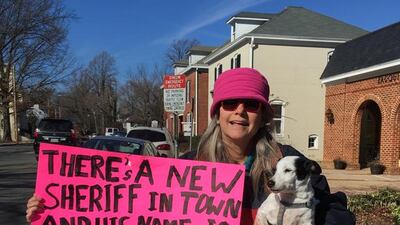WARRENTON, United States // When a group of demonstrators gathered in the small town of Warrenton, Virginia, for a protest march against president Donald Trump one recent Saturday, Kelly Anne Finn felt she had to take a stand.
Ms Finn, 58, took her dog Jack and a sign she made to the march to show support for the president. “There’s a new sheriff in town and his name is Prez Donald J Trump,” her sign read.
The protesters were unimpressed, and one of them called Mr Trump a “fascist”, Ms Finn, a retired lawyer, recounted after the march. “They should at least give him a chance.”
For Ms Finn, there is no doubt that Mr Trump is right for the country. She said she had watched the real estate mogul ever since she read his bestseller The Art of the Deal in the 1980s. “I waited 30 years for him to run” for president.
But the president is facing an uphill struggle against people who refuse to recognise his victory, she said.
“He is being attacked every day. I thought the country would be more united after the election, but it’s gotten worse.”
A solid majority of voters in Warrenton, a town of about 10,000 people some 80 kilometres south-west of Washington, DC supported Mr Trump in the November election. He took 59 per cent of the vote in Fauquier County, of which Warrenton is the biggest town, more than his 46 per cent share of the popular vote country-wide. His rival Hillary Clinton, who raked in more than 48 per cent of the vote nationally, was a distant second in Warrenton with just under 35 per cent.
But despite the result, Trump voters in Warrenton said they felt under pressure from his opponents in the big cities along the east and the west coasts, from the political elite in Washington and from the media.
Several people in the town agreed to talk about their political views only on condition of anonymity, saying they were concerned about reprisals at work or socially. A local journalist spoke of an “incredible amount of support” for Trump in the region. “But people are not willing to talk about it.”
In a restaurant on Main Street, a waitress said some Trump supporters feared for their jobs. “A friend of mine says she does not mention that she voted for Trump at work because she is afraid she’ll get fired,” she said.
“There is a disconnect between the real America and the coasts,” said Jim, a waiter in a wine shop in Culpeper, a town south of Warrenton where support for Mr Trump also was around 60 per cent in November. “People are like: ‘I am trying to get by here, but they’re talking about which bathroom to use’,” Jim said in reference to a political debate about the use of public toilets by transgender people.
Mr Trump was carried to the White House by a wave of public anger against the political establishment and hopes that he would create new manufacturing jobs. He has also promised to provide protection from Islamic extremism and from illegal immigrants. Opponents say he is encouraging xenophobia and Islamophobia.
But even some of Mr Trump’s political rivals say the president won because his opponents failed to connect with the middle class. “Look, you can’t simply go around to wealthy people’s homes raising money and expect to win elections,” senator Bernie Sanders of Vermont, who was defeated by Mrs Clinton in the Democratic primaries, told the broadcaster NPR. “You’ve got to go out and mix it up and be with ordinary people.”
The New York Times executive editor Dean Baquet admitted in another NPR interview that his newspaper “did not have a handle on just how much anxiety there was in the country” before the election.
“We want law and order,” said Wally Hudson, a baker in Culpeper. “We haven’t had that for eight years.” Mr Hudson said people like him were hesitant to speak out about problems like illegal immigration for fear of getting “a smack on the head”.
Back in Warrenton, a shop worker in the Highflyer Arms weapons store was bitter about what he saw as a refusal by Mr Trump’s opponents to accept defeat. “It’s hysteria,” the man said about the nationwide protests against the President. “If the Left loses, there is revolution.” He said Mr Trump was promising a new beginning very much like his predecessor Barack Obama did when he came to power in 2009. “Obama wanted a fundamental change, but when Trump says the same thing, he is compared to Hitler.”
foreign.desk@thenational.ae

